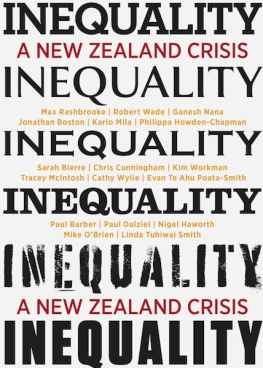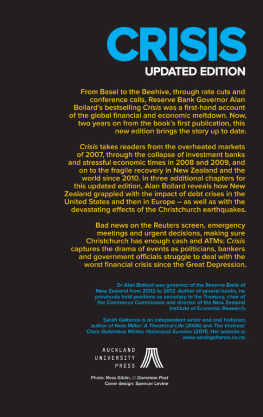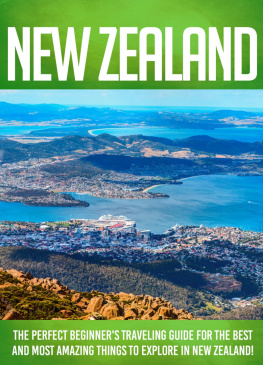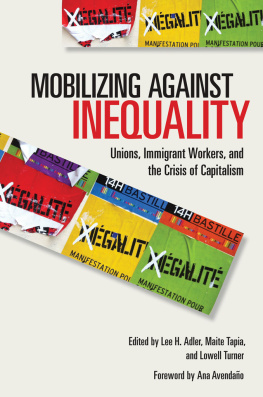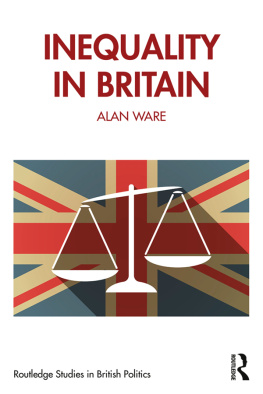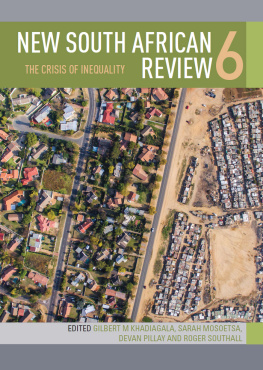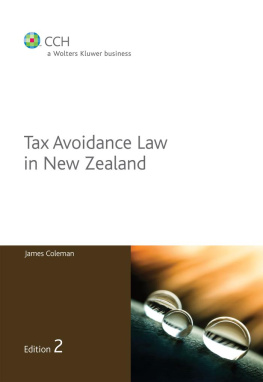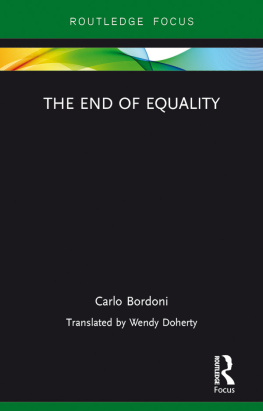Max Rashbrooke - Inequality: A New Zealand Crisis
Here you can read online Max Rashbrooke - Inequality: A New Zealand Crisis full text of the book (entire story) in english for free. Download pdf and epub, get meaning, cover and reviews about this ebook. year: 2013, publisher: Bridget Williams Books, genre: Politics. Description of the work, (preface) as well as reviews are available. Best literature library LitArk.com created for fans of good reading and offers a wide selection of genres:
Romance novel
Science fiction
Adventure
Detective
Science
History
Home and family
Prose
Art
Politics
Computer
Non-fiction
Religion
Business
Children
Humor
Choose a favorite category and find really read worthwhile books. Enjoy immersion in the world of imagination, feel the emotions of the characters or learn something new for yourself, make an fascinating discovery.
- Book:Inequality: A New Zealand Crisis
- Author:
- Publisher:Bridget Williams Books
- Genre:
- Year:2013
- Rating:3 / 5
- Favourites:Add to favourites
- Your mark:
- 60
- 1
- 2
- 3
- 4
- 5
Inequality: A New Zealand Crisis: summary, description and annotation
We offer to read an annotation, description, summary or preface (depends on what the author of the book "Inequality: A New Zealand Crisis" wrote himself). If you haven't found the necessary information about the book — write in the comments, we will try to find it.
Inequality: A New Zealand Crisis — read online for free the complete book (whole text) full work
Below is the text of the book, divided by pages. System saving the place of the last page read, allows you to conveniently read the book "Inequality: A New Zealand Crisis" online for free, without having to search again every time where you left off. Put a bookmark, and you can go to the page where you finished reading at any time.
Font size:
Interval:
Bookmark:
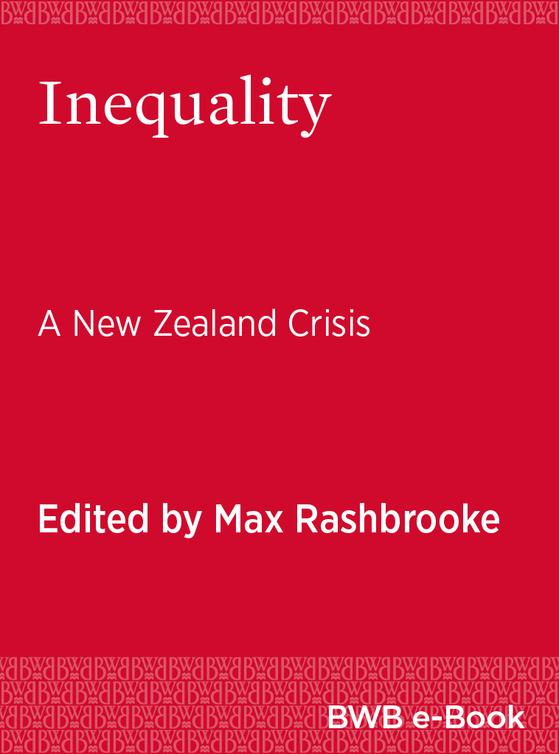
v
viii
Paul Barber is a policy advisor at the New Zealand Council of Christian Social Services (NZCCSS) and leads the councils flagship programme, Closer Together Whakatata Mai reducing inequalities.
Sarah Bierre is a research fellow in the He Kainga Oranga / Housing and Health Research Programme, at the University of Otago, Wellington.
Jonathan Boston is the Director of the Institute for Governance and Policy Studies in the School of Government at Victoria University of Wellington. The author of numerous books and articles, Professor Boston is a leading contributor to policy debate in New Zealand on a range of issues, and was the co-chair of the Childrens Commissioners Expert Advisory Group on Solutions to Child Poverty in 2012.
Chris Cunningham (Ngti Toa, Ngti Raukawa) is the Director of the Research Centre for Mori Health and Development at Massey University, Wellington. He is a co-director of He Kainga Oranga / Housing and Health Research Programme.
Paul Dalziel is Professor of Economics at Lincoln University, and was the leader of one strand of a recent major research project looking at the links between education and employment.
Nigel Haworth is a labour market specialist at the University of Auckland, and a former chair of the Partnership Research Centre and the Centre for Housing Research. He fulfils a number of roles, in and outside the university, including membership of the New Zealand Labour Partys Policy Council and the International Labour Organizations Century Project.
Philippa Howden-Chapman is an expert on health inequalities at the University of Otago, Wellington and the author of research on poor housing and health. Professor Howden-Chapman is director of He Kainga Oranga / Housing and Health Research Programme and the New Zealand Centre for Sustainable Cities. She has received a number of national awards.
Tracey McIntosh (Thoe) is a Senior Lecturer at the University of Auckland. She has extensively researched issues around Mori development, imprisonment and marginalisation. A former director of the Centre of Research Excellence Ng Pae o te Mramatanga, she was also a co-chair of the Childrens Commissioners Expert Advisory Group on Solutions to Child Poverty.
Karlo Milas work spans the arts, commentary and academia. An award-winning poet of Tongan, Samoan and Palagi descent, she has also worked on Pacific health research, been a columnist for the Dominion Post, and recently completed a PhD in sociology on Pacific peoples.
ix Ganesh Nana is Chief Economist at research and consultancy firm Business and Economic Research Limited (BERL). He has over 30 years experience in economics, including as a lecturer at Victoria University of Wellington and working overseas. He is a regular commentator on the New Zealand economy for various media.
Mike OBrien is Associate Professor at the University of Auckland, and the Convenor of the Child Poverty Action Group. A leading figure in welfare debates, he was also the head of the Alternative Welfare Working Group.
Evan Te Ahu Poata-Smith (Te Rarawa, Ngti Kahu) is head of Indigenous Studies at the University of Wollongong. Prior to this he taught at the Auckland University of Technology and the University of Canterbury. More recently he was a Fulbright Scholar-in-Residence at Northern Arizona University where he taught in the Applied Indigenous Studies and Sociology programmes. His research focuses on Mori political and social change.
Max Rashbrooke has written for national newspapers and magazines in Britain and New Zealand, including the Guardian, the National Business Review and the Listener. He was the recipient of the 2011 Bruce Jesson Senior Journalism Award.
Linda Tuhiwai Smith (Ngti Awa, Ngti Porou) is Pro-Vice Chancellor Mori and Dean of Te Pua Wnanga ki te Ao School of Mori and Pacific Development at the University of Waikato. Professor Smith is the author of the influential book DecolonizingMethodologies: research and indigenous peoples, first published in 1999.
Robert Wade is Professor of Political Economy at the London School of Economics. A New Zealander, Robert H. Wade is a leading international writer on globalisation, inequality and world financial systems, author of the award-winning book Governing the Market, and winner of the Leontief Prize in Economics, 2008.
Kim Workman (Ngti Kahungunu ki Wairarapa, Rangitne) is founder and director of Rethinking Crime and Punishment. He was head of the prison service 198993, among other public service roles. He received the International Prize for Restorative Justice in 2005, and was awarded a QSO in 2007.
Cathy Wylie is chief researcher at the New Zealand Council for Educational Research. She leads Competent Children, Competent Learners, a longitudinal study of childrens development, and has just published Vital Connections, a major book on the school system.
x
This book has drawn on a wide range of expertise and support, as the preface acknowledges. In our warm thanks for advice and commentary, we acknowledge that the responsibility for the text lies finally with the authors.
The advisory group included Jonathan Boston (chair), Paul Callister, Len Cook, Philippa Howden-Chapman, Tracey McIntosh, Bridget Robson, Bob Stephens and Kim Workman. Others who contributed to early discussions include Colin James, Charlotte Macdonald and Tapu Misa. Valuable comments were provided by Carol Archie, Geoff Bertram, Simon Chapple, Joris de Bres, Tim Hazledine, Jim McAloon, John ONeill, Richard Pamatatau, John Pratt, Keith Rankin, Bill Rosenberg, Susan St John, Mmari Stephens, Geoff Walker and Denis Welch.
Many others have assisted with this project: Tim Davies-Colley, the staff of the Porirua Citizens Advice Bureau, Michele Whiting, Blair Badcock, and the Wesley Community Action team in Waitangirua, especially Lizzie McMillan-Makalio; Lyndy McIntyre; Stephanie McIntyre; Jeff Drane, Graham Howell, Mike Leon, the staff of the Wellington City Mission and the Wellington soup kitchen; Charles Waldegrave; Robert Whitaker and Ben McKeown; Julie Timmins; and Peter Malcolm and others in the Equality Network. Wide-ranging interviews were conducted for the personal viewpoints; some will be published subsequently (including those with Faye Rhodes and her partner Donny, and Puke from the Downtown Community Ministrys consumers group).
Copyright material has been reproduced with the permission of the following individuals and organisations. For Chapter 6, Woodcut Productions, on behalf of Tyree Tautogia, for Smashproof lyrics; Universal Music Publishing, representing Alan Jansson and Pauly Fuemana, for OMC Lyrics; Huia Publishers, for the poem by Karlo Mila. For graphs and tables, as acknowledged on the page: The Spirit Level, Penguin Books (London); Bryan Perry, Ministry of Social Development; Oxford University Press and John Wiley & Sons; Te Ara, Ministry for Culture and Heritage; Bill Rosenberg, New Zealand Council of Trade Unions; Statistics New Zealand.
Bridget Williams would like to offer special thanks to those who have provided funding support, as acknowledged in the preface and on the imprint page, for their critical role in making this book a reality.
As the books originator and editor, Max Rashbrooke has the final word, with thanks to the publishers for a strong commitment to this project, and to his family and friends.
Next pageFont size:
Interval:
Bookmark:
Similar books «Inequality: A New Zealand Crisis»
Look at similar books to Inequality: A New Zealand Crisis. We have selected literature similar in name and meaning in the hope of providing readers with more options to find new, interesting, not yet read works.
Discussion, reviews of the book Inequality: A New Zealand Crisis and just readers' own opinions. Leave your comments, write what you think about the work, its meaning or the main characters. Specify what exactly you liked and what you didn't like, and why you think so.

